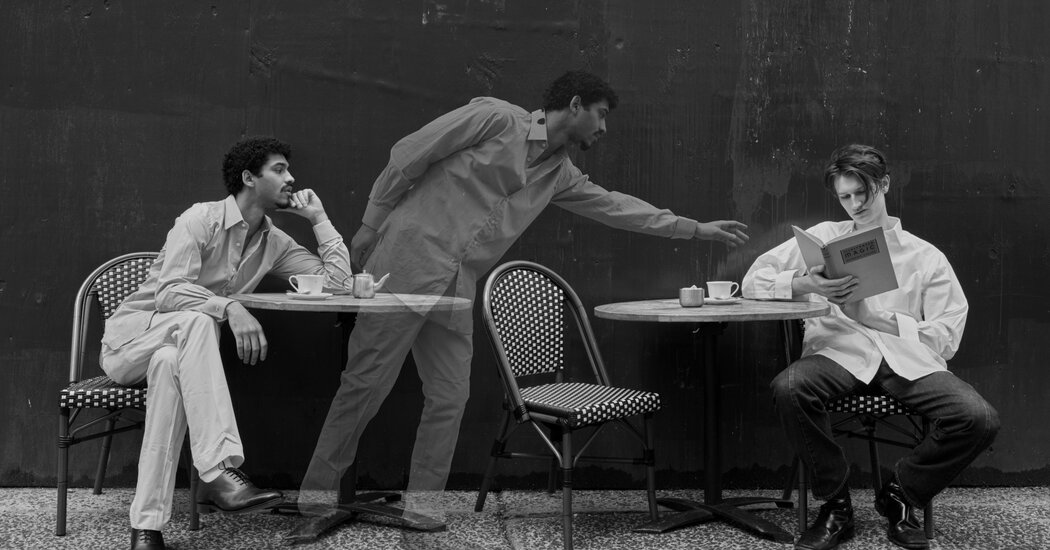To some, it also feels — there is no way to express this that is culturally or politically defensible, so let’s lay that aside for the moment — kind of hot. Many people get off on the transgressive, and there’s an argument to be made that today, being gay isn’t, but being closeted is. Films like “Plainclothes,” or Haynes’s “Carol” (2015), an adaptation of Patricia Highsmith’s pseudonymously written novel “The Price of Salt” (1952), about the affair between a young photographer and the elegant older woman she meets in Manhattan, understand the electric charge of furtiveness and secrecy, of dangerous trysts and of pursuing an erotic liaison when the whole world feels like your enemy. On popular cruising apps like Grindr and Sniffies, closeted men are just one more kink among many — a turn-on for guys who are interested in adding a sense of the forbidden to their hookup, and for (yes, this is also a thing) men who enjoy pretending to be closeted.
Still, the closet is obviously not a part of gay history to long for, to feel nostalgic about or to sentimentalize. So why the current obsession with one of the bleakest aspects — and a not-very-distant one — of the gay cultural landscape? It’s probably not an accident that it’s happening when it’s happening. Today gay men live in a world in which our struggles, our issues and our challenges are no longer seen as central to the L.G.B.T.Q. rights movement. A look at the headlines on almost any given day is a reminder that the fight right now, and very likely for some time to come, is for trans rights and acceptance. And gayness itself is no longer the identity that is most central to the movement, as it was through the liberation years and the first decade-plus of AIDS. A February Gallup poll showed that “bisexual” is now the most frequently claimed label among L.G.B.T.Q. Americans, with 5.2 percent of people opting for it; only 3.4 percent of people call themselves either gay or lesbian. For many younger queer people, coming out versus staying closeted is an antiquated choice, a form of pigeonholing with little resonance in a 21st century that’s more defined by a long drop-down menu of identity options, including “prefer not to say,” a choice that, for some of them, has none of the political weight that it might have carried right after Stonewall, or in the middle of the fight against the “don’t ask, don’t tell” policies that were adopted by the American military in the 1990s. To evoke 1974 or 1985 or 1997 onscreen is, for a couple of hours, to allow older gay men to forget our contemporary diminishment and the minimization of our history — to return to a world in which we were at the heart of queer culture and discourse. There is, undeniably, drama in oppression and romance in fighting it. We were the cause then. Now, not so much.
Perhaps stories of the closet are just a way to claim that our struggles still matter, although the tough-mindedness of many of these accounts suggests that something else may be at work. Every advance in the struggle for L.G.B.T.Q. rights has been predicated on gay people being willing to own their identities publicly and risk the consequences. That’s true on the macro level — marches, rallies, demonstrations, even riots — and on the micro level, where everything can come down to one individual decision to say, “This is me. I am this.”
We know those stories: Among their subjects are the people who end up on our personal Mount Rushmores. Yet it would be absurd to claim that either self-declaration or the realities of the closet belong in some museum of gay history. Plenty of gay people who consider themselves basically out still sequester that part of their lives at least some of the time, out of a desire to just get through the day without hassle; they’re out but not to their building super, or maybe their boss or perhaps that one troublesome aunt they only have to see when they go home for the holidays. Are they closeted, or are they just making a kind of private decision that straight people can live their entire lives without ever having to entertain?
But any type of “those who know know” compromise is, even for the nonfamous, a slippery slope at a time when many MAGA Republicans are eager to preside over a rollback of rights; to declare trans people both morally unfit to serve the country and biologically nonexistent; and to announce that Obergefell v. Hodges, the ruling that established the right to same-sex marriage 10 years ago, was nothing more than a mistake made by an old Supreme Court and correctable by a new one. It doesn’t require some imaginative leap into an Orwellian dystopia to conjure an America in which trans people are divided into those who can pass and those who can’t, or in which gay people must once again deny their identities in order to hold on to their jobs, apartments or children. Peering into the closet isn’t important only as a way of exploring the dark mirror image of the liberatory history of coming out. It’s a reminder that the decision to keep one’s hand unraised, to remain silent, to say nothing, is just as momentous and reverberant as coming out is, just as likely to change your life and to ripple, with effects that cannot always be anticipated, through the ensuing decades.
That’s one reason “Pee-wee as Himself” is ultimately as moving as it is; it may be the first documentary to explore how a celebrity feels about not coming out when he looks back through the entirety of his life as it draws to a close. Those who are expecting a self-justification from Reubens may be surprised at how cleareyed he is, starting with his distaste for the possibility that he’ll be seen as “a victim in some way” and his insistence on taking full responsibility for his decision. Yes, times were different then, and the pressures he faced were complex and unique, but in the film, he seems fully aware that some people will still dismiss him as someone who fled rather than fought, and who will insist that he has only himself to blame for any later sorrow. He doesn’t appear to disagree. “I was conscious enough to know being closeted would have some kind of effect on me. I was just like, ‘OK, put your blinders on — you’re not having any kind of traditional relationship,’” he says. “I kept who I was a secret for a very long time, and that really worked for me. Until it didn’t.” There aren’t many people, famous or otherwise, who get to write their own obituaries in that way. His is a hard one to hear.








